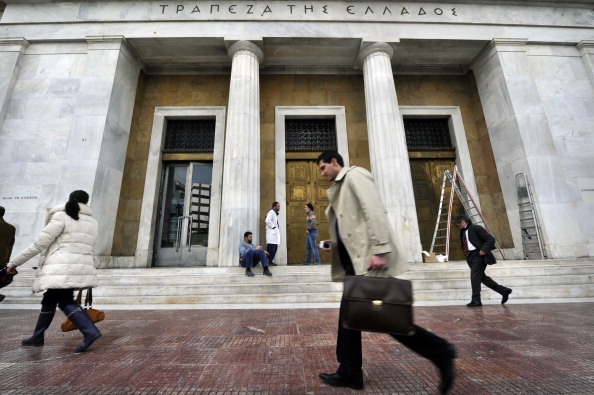Financial Times (UK)
5/17/2012
By Peter Spiegel

People pass Bank of Greece in Athens last week
Jitters over whether Greece will be forced out of the euro have turned the focus of policymakers in recent days on whether Greece is on the precipice of a bank run.
It’s no mere academic exercise; a full-scale bank run would force the European Central Bank and eurozone lenders to either pump in more money – without a new government in place and no assurances, Athens would live up to the rescue terms – or pull the plug on Greece’s financial sector.
Since a banking sector without a central bank would essentially force Greece back to the barter system, there would be few options left then for Athens to begin printing its own currency again. Essentially, the drachma would return through the back door.
As we reported in today’s dead-tree edition, senior eurozone officials, responsible for monitoring the currency area’s banking system, said, the rate of withdrawals thus far falls short of a panic. But the International Monetary Fund’s recent report on Greece makes it clear, that a slow-motion bank run has been under way for more, than two years with close to 30 per cent of deposits being pulled out since the end of 2009.
The IMF report is already a bit out of date, since it was published two months ago, but it still makes for sobering reading. It reported, that since the start of 2012, Greek banks had lost 6.4 per cent of their deposits:
The steady outflows – a major deposit run has been avoided – appear driven by private sector dissaving, as well as by capital flight to safe-havens outside of Greece (the latter representing about a quarter of total withdrawals).
And while the markets got a jolt yesterday, when the ECB acknowledged, four Greek banks had been cut off from its normal “liquidity operations” – the cheap ECB loans, that all Greek banks now need to run their day-to-day operations – and pushed onto the higher-priced “emergency liquidity assistance”, the IMF report says, that has been going on for quite some time:
The Eurosystem has stepped into the breach and by end-2011 had provided nearly €130bn (or 60 per cent of GDP) in support. Initial heavy reliance on Eurosystem liquidity support (with Eurosystem exposure peaking at €103bn in mid-2011) is gradually being replaced by Emergency Liquidity Assistance (ELA) from the Bank of Greece (BoG). The switch to ELA is imposing additional costs on banks, as the interest rate and fees are higher, than under the ECB window, but this remains an inexpensive form of financing for banks.
Some confidence could be restored over the course of the next weeks, if Greek authorities can finalise a massive recapitalisation of the Greek banks. In case anyone has forgotten, the massive €200bn debt restructuring, that was finalised last month, had an outsized impact on Greek banks, which held a huge portion of Greece’s sovereign bonds. The IMF said, it would cost Greek banks €22bn, compared to total Tier 1 capital of €23.8bn. So basically wiping them out almost entirely.
On April 19 the eurozone’s €440bn rescue fund, the European Financial Stability Facility, transferred €25bn in triple-A-rated bonds to Greece’s bank recapitalisation agency and the agency is due to inject €18bn into the country’s four largest banks by the end of next week at the latest. The legal holdups focus on ownership and control post-recapitalisation.
The ECB has indicated, it would be able to resume normal liquidity operations, after the recap is done. That will help. But it won’t prevent a bank run. For that we have to rely on the psychology of the masses.